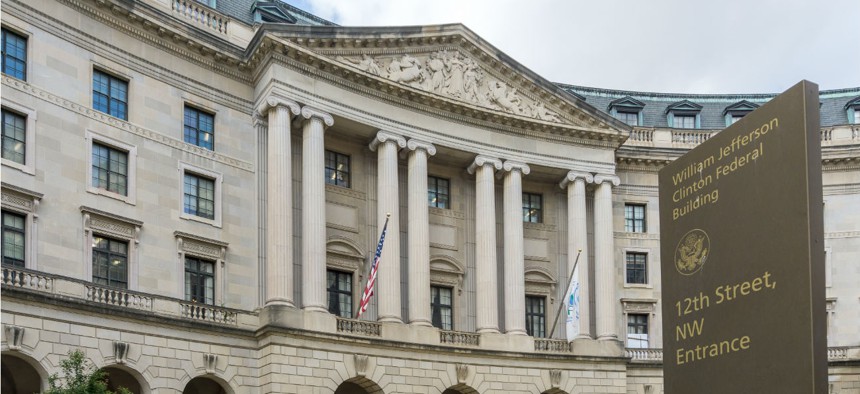
Erik Cox Photography / Shutterstock.com
EPA Failed to Ensure Outside Advisers Don’t Have Conflicts of Interest
Staff failed to follow agency procedures in documenting decisions, vetting financial disclosure forms.
The Environmental Protection Agency failed to follow its own ethics procedures to ensure members of its scientific advisory committees do not have conflicts of interest, a government watchdog found this week.
The Government Accountability Office found that EPA did not adequately vet appointees’ financial disclosure forms, nor did staff document their rationale for naming individuals to two key committees that advise the agency on regulatory matters—the EPA Science Advisory Board and the Clean Air Scientific Advisory Committee.
GAO released its report Tuesday at a House Science, Space and Technology Committee panel hearing.
“EPA’s inconsistent compliance with its own ethics policy related to advisory committee members raises doubts about the agency’s actions,” said Rep. Lizzie Fletcher, D-Texas, chair of the Committee’s panel on environment during the hearing.
EPA has 22 advisory committees that serve to provide the agency with advice on developing regulations and managing research programs, among other things. As such, EPA’s vetting process is supposed to ensure that members of those committees (known as special government employees) are qualified and act in the public interest. In its review, GAO examined documentation—including financial disclosure forms of appointed committee members and data from the General Services Administration’s Federal Advisory Committee database—from fiscal year 2017 through the first half of fiscal 2018.
In its review, GAO found that with 57% of the financial disclosure forms filed by individuals selected for the committees, the auditors could not determine if an ethics official had reviewed them within 60 days as required, because the forms were not dated as to when they were received. With 23% of the forms GAO reviewed, auditors found ethics officials had not signed and dated the forms to indicate the filer was in compliance with ethics laws. The financial disclosure forms are part of the vetting process to ensure committee members don’t have conflicts of interest. EPA attributed this incomplete documentation to a lack of staffing.
“Until EPA's Ethics Office evaluates the quality of financial disclosure reviews of [special government employees] as part of its periodic review of its ethics program, it will not have reasonable assurance that it will address noncompliance with federal ethics requirements and prevent conflicts of interest on its advisory committees,” said Alfredo Gomez, a director at the Government Accountability Office’s Natural Resources and Environment team who testified at the hearing. He told Government Executive this was the first time GAO did an ethics probe of advisory committees at EPA.
The agency also did not prepare information packets for the committee members selected for the Science Advisory Board and Clean Air Scientific Advisory Committee. These packets, which are called draft membership grids, explain to EPA senior leaders why staff want to include the proposed members and are recommended by the EPA’s Federal Advisory Committee Handbook. The agency management requested briefings instead of the packets.
“Unfortunately, over the course of the last two and a half years, we have seen a multi-pronged attack on these committees,” said Rep. Miki Sherrill (D-N.J.) during the hearing. She spoke about how former EPA Administrator Scottt Pruitt banned some researchers from serving on scientific advisory committees, yet allowed people paid by industries to serve.
The Environmental Protection Agency “generally followed its established processes,” according to GAO. The watchdog recommended EPA Administrator Andrew Wheeler direct all officials involved in the appointment process to follow protocol and document their decisions for selecting candidates for committee membership. GAO also recommends the EPA’s ethics office review the financial disclosure process to ensure it meets all ethics requirements.
In response to GAO’s findings, Donna Vizian, EPA’s principal deputy assistant administrator, acknowledged the agency could bolster oversight of the ethics program and said the agency had resolved staffing issues. However, she took issue with the recommendation to document the staff’s rationale for selecting advisory committee members and said it was “within the discretion of the EPA administrator” to request briefings instead of the information packets.
Image via Erik Cox Photography/Shutterstock.com.
NEXT STORY: Leaks Are Changing How Diplomats Talk







